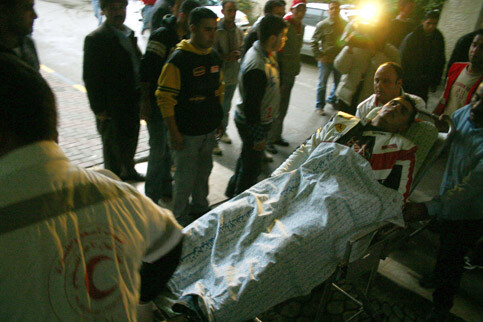B'Tselem 25 January 2007

Palestinians transport an injured youth to a hospital after he was shot by Israeli special forces during an undercover Israeli military operation in the West Bank city of Ramallah, 15 November 2006. Eyewitnesses reported that one Palestinian was arrested and two others were injured. (MaanImages/Fadi Arouri)
Today, B’Tselem is publishing the findings of its investigation into the action by undercover forces that went awry in Ramallah on 4 January. During an operation to arrest wanted Palestinians, the undercover forces were exposed, resulting in a confrontation with Palestinians who threw stones and petrol bombs at the Israeli undercover and rescue forces, who responded with gunfire. Attack helicopters used machinegun fire to provide cover to the rescue operation. B’Tselem also received reports of gunfire by armed Palestinians.
During the operation, Israeli security forces killed four Palestinians. Another 40 Palestinians were wounded, ten of them seriously. Four Israeli security forces suffered light injuries. B’Tselem found that none of the four fatalities were armed and three of them took no part in the confrontation.
In light of B’Tselem’s findings, the organization wrote to the Judge Advocate General of the Israeli military and demanded that he order the opening of a Military Police investigation. This investigation should examine the legality of the decision to carry out the arrest operation. It should also investigate whether the soldiers and Border Police officers fired illegally and caused extensive destruction of property in violation of international humanitarian law.
B’Tselem also calls on the JAG to instruct the army to immediately cease using undercover soldiers in any action that the army defines as combat. The laws of warfare prohibit perfidy. Combatants feigning civilian status come within this classification. The undercover soldiers and the officials who dispatch them may also bear individual responsibility for war crimes, given that injuring or killing a person while breaching the prohibition on perfidy is a war crime under international criminal law.
The incident in Ramallah is a clear example of why the prohibition on combatants feigning civilian status was created. Many civilians were killed and wounded after being caught unawares in the area because they could not identify the disguised combatants among them. Another reason for the prohibition on undercover forces is to prevent civilians from being marked for attack on suspicion they are combatants in disguise. The fact that Palestinians taking part in the hostilities do not distinguish themselves from civilians does not release Israeli security forces from its obligation to do so.
Related Links